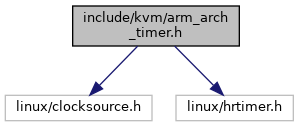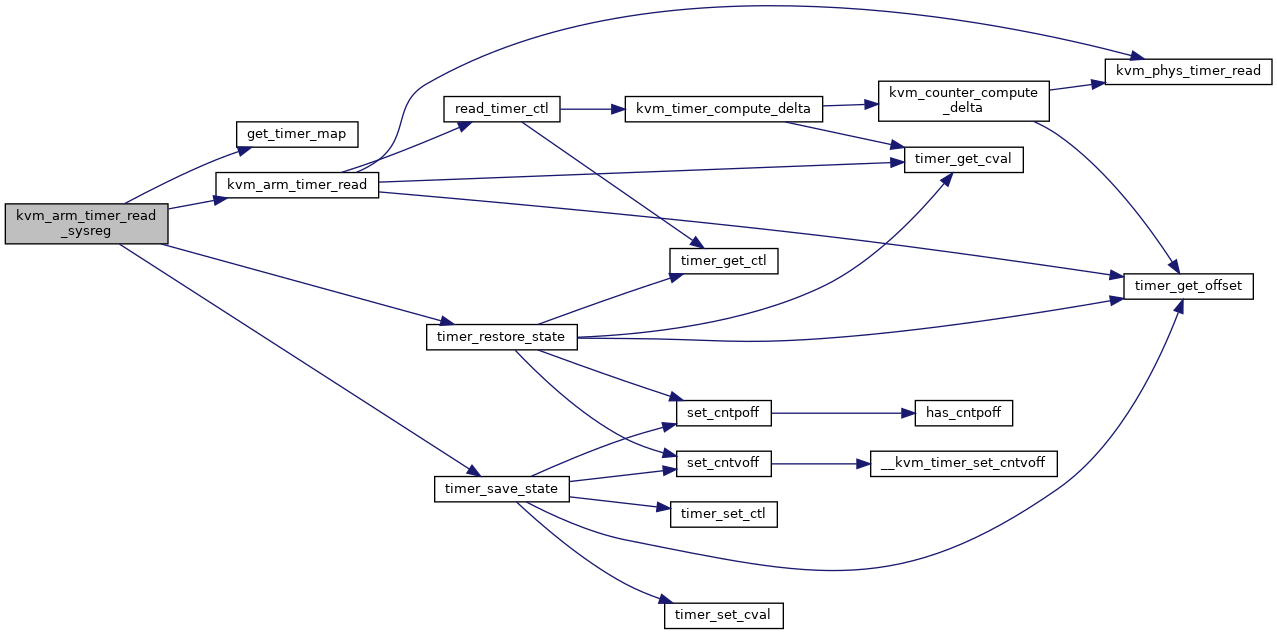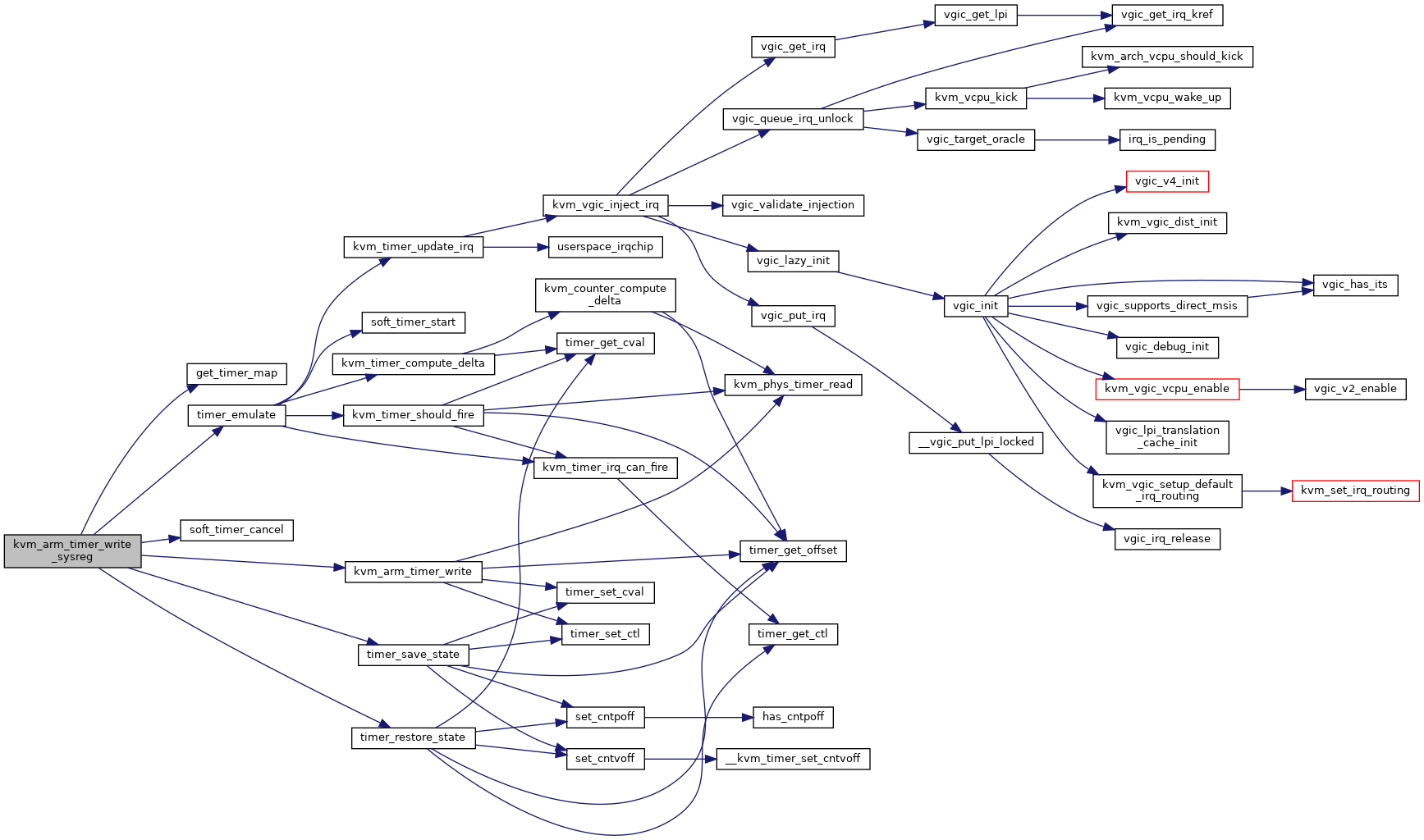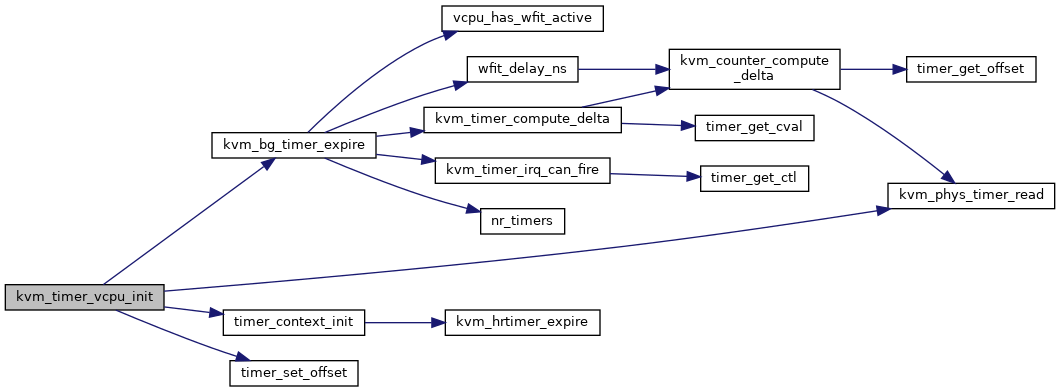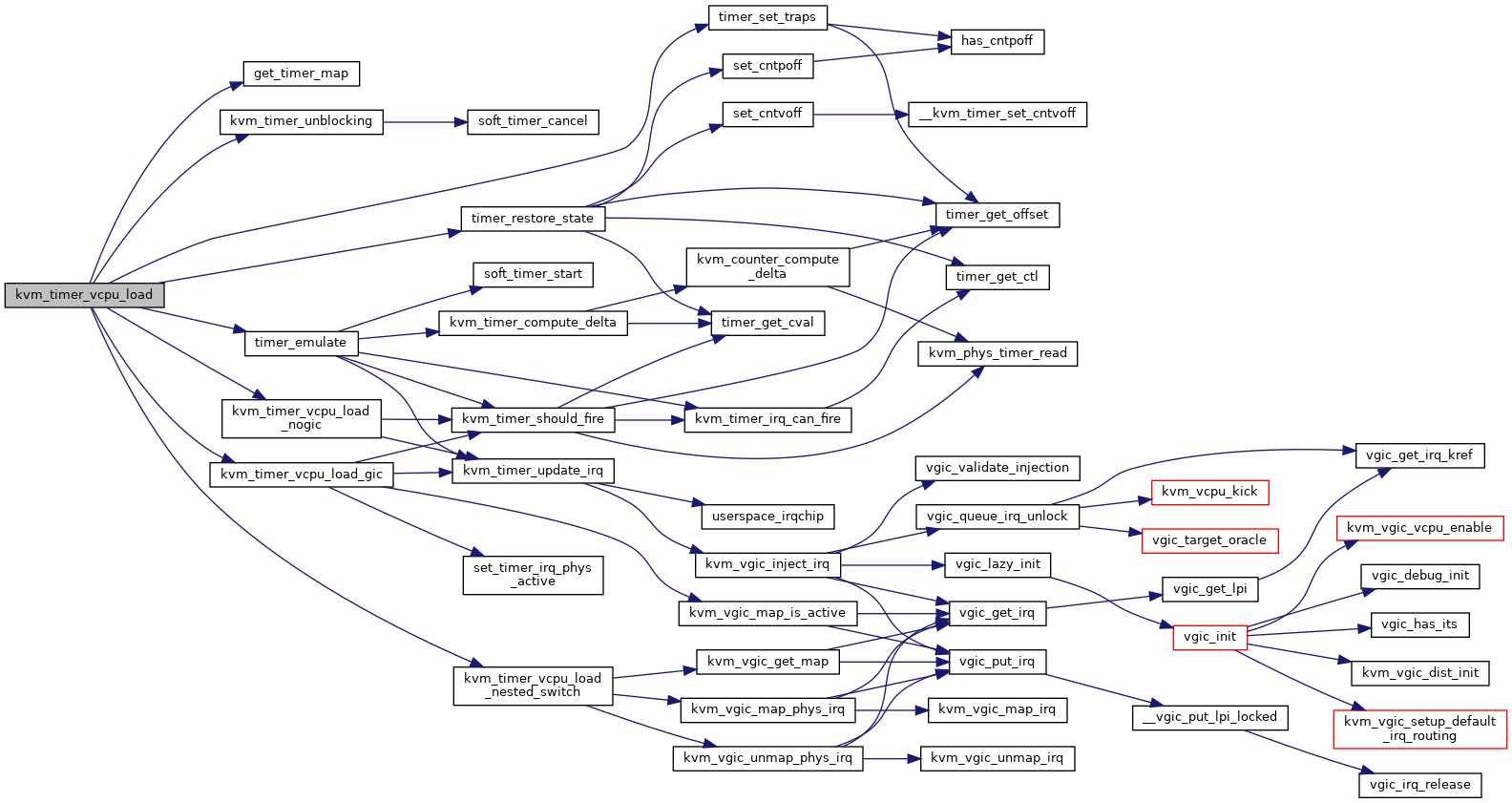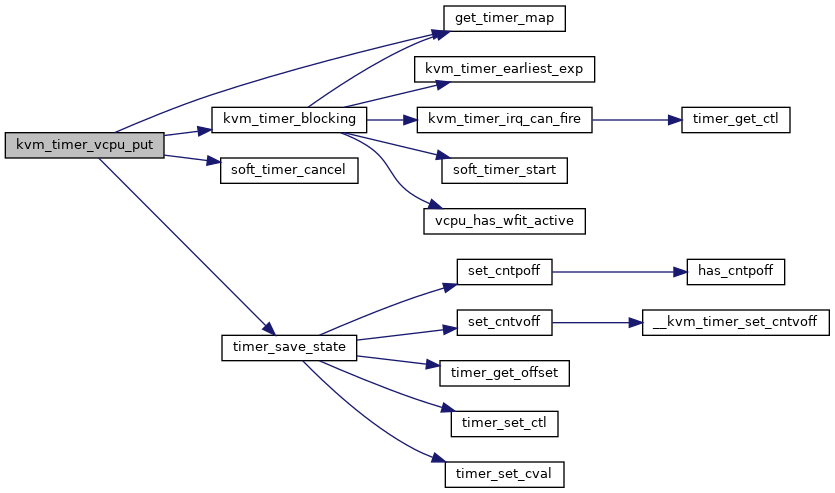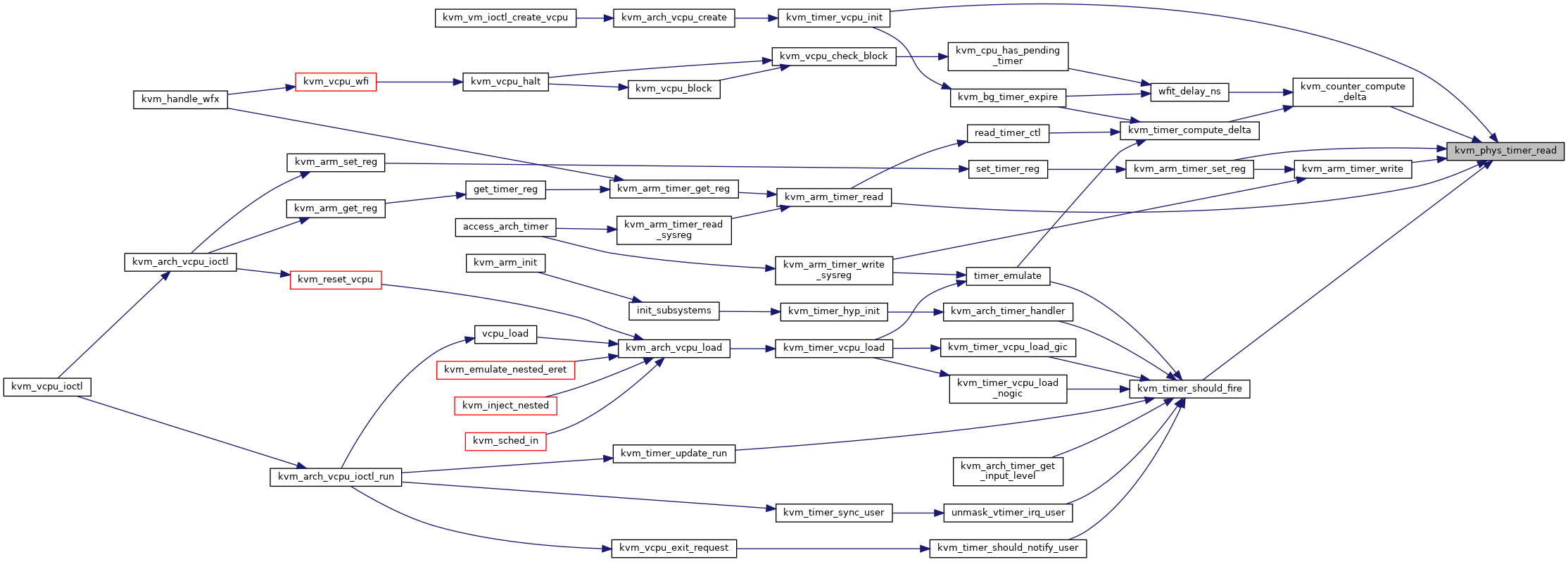#include <linux/clocksource.h>
#include <linux/hrtimer.h>
Go to the source code of this file.
|
| void | get_timer_map (struct kvm_vcpu *vcpu, struct timer_map *map) |
| |
| int __init | kvm_timer_hyp_init (bool has_gic) |
| |
| int | kvm_timer_enable (struct kvm_vcpu *vcpu) |
| |
| void | kvm_timer_vcpu_reset (struct kvm_vcpu *vcpu) |
| |
| void | kvm_timer_vcpu_init (struct kvm_vcpu *vcpu) |
| |
| void | kvm_timer_sync_user (struct kvm_vcpu *vcpu) |
| |
| bool | kvm_timer_should_notify_user (struct kvm_vcpu *vcpu) |
| |
| void | kvm_timer_update_run (struct kvm_vcpu *vcpu) |
| |
| void | kvm_timer_vcpu_terminate (struct kvm_vcpu *vcpu) |
| |
| void | kvm_timer_init_vm (struct kvm *kvm) |
| |
| u64 | kvm_arm_timer_get_reg (struct kvm_vcpu *, u64 regid) |
| |
| int | kvm_arm_timer_set_reg (struct kvm_vcpu *, u64 regid, u64 value) |
| |
| int | kvm_arm_timer_set_attr (struct kvm_vcpu *vcpu, struct kvm_device_attr *attr) |
| |
| int | kvm_arm_timer_get_attr (struct kvm_vcpu *vcpu, struct kvm_device_attr *attr) |
| |
| int | kvm_arm_timer_has_attr (struct kvm_vcpu *vcpu, struct kvm_device_attr *attr) |
| |
| u64 | kvm_phys_timer_read (void) |
| |
| void | kvm_timer_vcpu_load (struct kvm_vcpu *vcpu) |
| |
| void | kvm_timer_vcpu_put (struct kvm_vcpu *vcpu) |
| |
| void | kvm_timer_init_vhe (void) |
| |
| u64 | kvm_arm_timer_read_sysreg (struct kvm_vcpu *vcpu, enum kvm_arch_timers tmr, enum kvm_arch_timer_regs treg) |
| |
| void | kvm_arm_timer_write_sysreg (struct kvm_vcpu *vcpu, enum kvm_arch_timers tmr, enum kvm_arch_timer_regs treg, u64 val) |
| |
| u32 | timer_get_ctl (struct arch_timer_context *ctxt) |
| |
| u64 | timer_get_cval (struct arch_timer_context *ctxt) |
| |
| void | kvm_timer_cpu_up (void) |
| |
| void | kvm_timer_cpu_down (void) |
| |
| static bool | has_cntpoff (void) |
| |
◆ arch_timer_ctx_index
| #define arch_timer_ctx_index |
( |
|
ctx | ) |
((ctx) - vcpu_timer((ctx)->vcpu)->timers) |
◆ timer_irq
◆ timer_vm_data
| #define timer_vm_data |
( |
|
ctx | ) |
(&(ctx)->vcpu->kvm->arch.timer_data) |
◆ vcpu_get_timer
| #define vcpu_get_timer |
( |
|
v, |
|
|
|
t |
|
) |
| (&vcpu_timer(v)->timers[(t)]) |
◆ vcpu_hptimer
| #define vcpu_hptimer |
( |
|
v | ) |
(&(v)->arch.timer_cpu.timers[TIMER_HPTIMER]) |
◆ vcpu_hvtimer
| #define vcpu_hvtimer |
( |
|
v | ) |
(&(v)->arch.timer_cpu.timers[TIMER_HVTIMER]) |
◆ vcpu_ptimer
| #define vcpu_ptimer |
( |
|
v | ) |
(&(v)->arch.timer_cpu.timers[TIMER_PTIMER]) |
◆ vcpu_timer
| #define vcpu_timer |
( |
|
v | ) |
(&(v)->arch.timer_cpu) |
◆ vcpu_vtimer
| #define vcpu_vtimer |
( |
|
v | ) |
(&(v)->arch.timer_cpu.timers[TIMER_VTIMER]) |
◆ kvm_arch_timer_regs
| Enumerator |
|---|
| TIMER_REG_CNT | |
| TIMER_REG_CVAL | |
| TIMER_REG_TVAL | |
| TIMER_REG_CTL | |
| TIMER_REG_VOFF | |
Definition at line 22 of file arm_arch_timer.h.
◆ kvm_arch_timers
| Enumerator |
|---|
| TIMER_PTIMER | |
| TIMER_VTIMER | |
| NR_KVM_EL0_TIMERS | |
| TIMER_HVTIMER | |
| TIMER_HPTIMER | |
| NR_KVM_TIMERS | |
Definition at line 13 of file arm_arch_timer.h.
◆ get_timer_map()
| void get_timer_map |
( |
struct kvm_vcpu * |
vcpu, |
|
|
struct timer_map * |
map |
|
) |
| |
Definition at line 178 of file arch_timer.c.
180 if (vcpu_has_nv(vcpu)) {
181 if (is_hyp_ctxt(vcpu)) {
192 }
else if (has_vhe()) {
204 trace_kvm_get_timer_map(vcpu->vcpu_id, map);
struct arch_timer_context * direct_vtimer
struct arch_timer_context * direct_ptimer
struct arch_timer_context * emul_ptimer
struct arch_timer_context * emul_vtimer
◆ has_cntpoff()
| static bool has_cntpoff |
( |
void |
| ) |
|
|
inlinestatic |
Definition at line 150 of file arm_arch_timer.h.
152 return (has_vhe() && cpus_have_final_cap(ARM64_HAS_ECV_CNTPOFF));
◆ kvm_arm_timer_get_attr()
| int kvm_arm_timer_get_attr |
( |
struct kvm_vcpu * |
vcpu, |
|
|
struct kvm_device_attr * |
attr |
|
) |
| |
Definition at line 1611 of file arch_timer.c.
1613 int __user *uaddr = (
int __user *)(
long)attr->addr;
1617 switch (attr->attr) {
1618 case KVM_ARM_VCPU_TIMER_IRQ_VTIMER:
1621 case KVM_ARM_VCPU_TIMER_IRQ_PTIMER:
1624 case KVM_ARM_VCPU_TIMER_IRQ_HVTIMER:
1627 case KVM_ARM_VCPU_TIMER_IRQ_HPTIMER:
1635 return put_user(
irq, uaddr);
struct arch_timer_context::@18 irq
◆ kvm_arm_timer_get_reg()
| u64 kvm_arm_timer_get_reg |
( |
struct kvm_vcpu * |
vcpu, |
|
|
u64 |
regid |
|
) |
| |
Definition at line 1107 of file arch_timer.c.
1110 case KVM_REG_ARM_TIMER_CTL:
1113 case KVM_REG_ARM_TIMER_CNT:
1116 case KVM_REG_ARM_TIMER_CVAL:
1119 case KVM_REG_ARM_PTIMER_CTL:
1122 case KVM_REG_ARM_PTIMER_CNT:
1125 case KVM_REG_ARM_PTIMER_CVAL:
static u64 kvm_arm_timer_read(struct kvm_vcpu *vcpu, struct arch_timer_context *timer, enum kvm_arch_timer_regs treg)
◆ kvm_arm_timer_has_attr()
| int kvm_arm_timer_has_attr |
( |
struct kvm_vcpu * |
vcpu, |
|
|
struct kvm_device_attr * |
attr |
|
) |
| |
Definition at line 1638 of file arch_timer.c.
1640 switch (attr->attr) {
1641 case KVM_ARM_VCPU_TIMER_IRQ_VTIMER:
1642 case KVM_ARM_VCPU_TIMER_IRQ_PTIMER:
1643 case KVM_ARM_VCPU_TIMER_IRQ_HVTIMER:
1644 case KVM_ARM_VCPU_TIMER_IRQ_HPTIMER:
◆ kvm_arm_timer_read_sysreg()
Definition at line 1167 of file arch_timer.c.
1178 if (timer == map.emul_vtimer || timer == map.emul_ptimer)
static void timer_save_state(struct arch_timer_context *ctx)
static void timer_restore_state(struct arch_timer_context *ctx)
void get_timer_map(struct kvm_vcpu *vcpu, struct timer_map *map)
#define vcpu_get_timer(v, t)
◆ kvm_arm_timer_set_attr()
| int kvm_arm_timer_set_attr |
( |
struct kvm_vcpu * |
vcpu, |
|
|
struct kvm_device_attr * |
attr |
|
) |
| |
Definition at line 1559 of file arch_timer.c.
1561 int __user *uaddr = (
int __user *)(
long)attr->addr;
1562 int irq, idx, ret = 0;
1567 if (get_user(irq, uaddr))
1573 mutex_lock(&vcpu->kvm->arch.config_lock);
1575 if (test_bit(KVM_ARCH_FLAG_TIMER_PPIS_IMMUTABLE,
1576 &vcpu->kvm->arch.flags)) {
1581 switch (attr->attr) {
1582 case KVM_ARM_VCPU_TIMER_IRQ_VTIMER:
1585 case KVM_ARM_VCPU_TIMER_IRQ_PTIMER:
1588 case KVM_ARM_VCPU_TIMER_IRQ_HVTIMER:
1591 case KVM_ARM_VCPU_TIMER_IRQ_HPTIMER:
1604 vcpu->kvm->arch.timer_data.ppi[idx] = irq;
1607 mutex_unlock(&vcpu->kvm->arch.config_lock);
#define irqchip_in_kernel(k)
◆ kvm_arm_timer_set_reg()
| int kvm_arm_timer_set_reg |
( |
struct kvm_vcpu * |
vcpu, |
|
|
u64 |
regid, |
|
|
u64 |
value |
|
) |
| |
Definition at line 1048 of file arch_timer.c.
1053 case KVM_REG_ARM_TIMER_CTL:
1057 case KVM_REG_ARM_TIMER_CNT:
1058 if (!test_bit(KVM_ARCH_FLAG_VM_COUNTER_OFFSET,
1059 &
vcpu->kvm->arch.flags)) {
1064 case KVM_REG_ARM_TIMER_CVAL:
1068 case KVM_REG_ARM_PTIMER_CTL:
1072 case KVM_REG_ARM_PTIMER_CNT:
1073 if (!test_bit(KVM_ARCH_FLAG_VM_COUNTER_OFFSET,
1074 &
vcpu->kvm->arch.flags)) {
1079 case KVM_REG_ARM_PTIMER_CVAL:
static void timer_set_offset(struct arch_timer_context *ctxt, u64 offset)
u64 kvm_phys_timer_read(void)
static void kvm_arm_timer_write(struct kvm_vcpu *vcpu, struct arch_timer_context *timer, enum kvm_arch_timer_regs treg, u64 val)
◆ kvm_arm_timer_write_sysreg()
Definition at line 1219 of file arch_timer.c.
1229 if (timer == map.emul_vtimer || timer == map.emul_ptimer) {
static void timer_emulate(struct arch_timer_context *ctx)
static void soft_timer_cancel(struct hrtimer *hrt)
◆ kvm_phys_timer_read()
| u64 kvm_phys_timer_read |
( |
void |
| ) |
|
Definition at line 173 of file arch_timer.c.
static struct timecounter * timecounter
◆ kvm_timer_cpu_down()
| void kvm_timer_cpu_down |
( |
void |
| ) |
|
Definition at line 1041 of file arch_timer.c.
static unsigned int host_ptimer_irq
static unsigned int host_vtimer_irq
◆ kvm_timer_cpu_up()
| void kvm_timer_cpu_up |
( |
void |
| ) |
|
Definition at line 1034 of file arch_timer.c.
static u32 host_vtimer_irq_flags
static u32 host_ptimer_irq_flags
◆ kvm_timer_enable()
| int kvm_timer_enable |
( |
struct kvm_vcpu * |
vcpu | ) |
|
Definition at line 1506 of file arch_timer.c.
1524 kvm_debug(
"incorrectly configured timer irqs\n");
1531 map.direct_vtimer->host_timer_irq,
1537 if (map.direct_ptimer) {
1539 map.direct_ptimer->host_timer_irq,
static struct irq_ops arch_timer_irq_ops
static bool timer_irqs_are_valid(struct kvm_vcpu *vcpu)
int kvm_vgic_map_phys_irq(struct kvm_vcpu *vcpu, unsigned int host_irq, u32 vintid, struct irq_ops *ops)
◆ kvm_timer_hyp_init()
| int __init kvm_timer_hyp_init |
( |
bool |
has_gic | ) |
|
Definition at line 1367 of file arch_timer.c.
1369 struct arch_timer_kvm_info *info;
1372 info = arch_timer_get_kvm_info();
1376 kvm_err(
"kvm_arch_timer: uninitialized timecounter\n");
1389 kvm_err(
"kvm_arch_timer: can't request vtimer interrupt %d (%d)\n",
1398 kvm_err(
"kvm_arch_timer: error setting vcpu affinity\n");
1399 goto out_free_vtimer_irq;
1402 static_branch_enable(&has_gic_active_state);
1409 if (info->physical_irq > 0) {
1413 kvm_err(
"kvm_arch_timer: can't request ptimer interrupt %d (%d)\n",
1415 goto out_free_vtimer_irq;
1422 kvm_err(
"kvm_arch_timer: error setting vcpu affinity\n");
1423 goto out_free_ptimer_irq;
1428 }
else if (has_vhe()) {
1429 kvm_err(
"kvm_arch_timer: invalid physical timer IRQ: %d\n",
1430 info->physical_irq);
1432 goto out_free_vtimer_irq;
1437 out_free_ptimer_irq:
1438 if (info->physical_irq > 0)
1440 out_free_vtimer_irq:
static int kvm_irq_init(struct arch_timer_kvm_info *info)
static irqreturn_t kvm_arch_timer_handler(int irq, void *dev_id)
struct kvm_vcpu *__percpu * kvm_get_running_vcpus(void)
◆ kvm_timer_init_vhe()
| void kvm_timer_init_vhe |
( |
void |
| ) |
|
Definition at line 1553 of file arch_timer.c.
1555 if (cpus_have_final_cap(ARM64_HAS_ECV_CNTPOFF))
1556 sysreg_clear_set(cnthctl_el2, 0, CNTHCTL_ECV);
◆ kvm_timer_init_vm()
| void kvm_timer_init_vm |
( |
struct kvm * |
kvm | ) |
|
◆ kvm_timer_should_notify_user()
| bool kvm_timer_should_notify_user |
( |
struct kvm_vcpu * |
vcpu | ) |
|
Definition at line 860 of file arch_timer.c.
864 struct kvm_sync_regs *sregs = &vcpu->run->s.regs;
870 vlevel = sregs->device_irq_level & KVM_ARM_DEV_EL1_VTIMER;
871 plevel = sregs->device_irq_level & KVM_ARM_DEV_EL1_PTIMER;
static bool kvm_timer_should_fire(struct arch_timer_context *timer_ctx)
◆ kvm_timer_sync_user()
| void kvm_timer_sync_user |
( |
struct kvm_vcpu * |
vcpu | ) |
|
Definition at line 927 of file arch_timer.c.
static void unmask_vtimer_irq_user(struct kvm_vcpu *vcpu)
◆ kvm_timer_update_run()
| void kvm_timer_update_run |
( |
struct kvm_vcpu * |
vcpu | ) |
|
Definition at line 430 of file arch_timer.c.
434 struct kvm_sync_regs *regs = &vcpu->run->s.regs;
437 regs->device_irq_level &= ~(KVM_ARM_DEV_EL1_VTIMER |
438 KVM_ARM_DEV_EL1_PTIMER);
440 regs->device_irq_level |= KVM_ARM_DEV_EL1_VTIMER;
442 regs->device_irq_level |= KVM_ARM_DEV_EL1_PTIMER;
◆ kvm_timer_vcpu_init()
| void kvm_timer_vcpu_init |
( |
struct kvm_vcpu * |
vcpu | ) |
|
Definition at line 1011 of file arch_timer.c.
1019 if (!test_bit(KVM_ARCH_FLAG_VM_COUNTER_OFFSET, &vcpu->kvm->arch.flags)) {
1024 hrtimer_init(&timer->
bg_timer, CLOCK_MONOTONIC, HRTIMER_MODE_ABS_HARD);
static void timer_context_init(struct kvm_vcpu *vcpu, int timerid)
static enum hrtimer_restart kvm_bg_timer_expire(struct hrtimer *hrt)
◆ kvm_timer_vcpu_load()
| void kvm_timer_vcpu_load |
( |
struct kvm_vcpu * |
vcpu | ) |
|
Definition at line 826 of file arch_timer.c.
836 if (static_branch_likely(&has_gic_active_state)) {
837 if (vcpu_has_nv(vcpu))
841 if (map.direct_ptimer)
850 if (map.direct_ptimer)
static void kvm_timer_vcpu_load_gic(struct arch_timer_context *ctx)
static void kvm_timer_vcpu_load_nogic(struct kvm_vcpu *vcpu)
static void kvm_timer_vcpu_load_nested_switch(struct kvm_vcpu *vcpu, struct timer_map *map)
static void kvm_timer_unblocking(struct kvm_vcpu *vcpu)
static void timer_set_traps(struct kvm_vcpu *vcpu, struct timer_map *map)
◆ kvm_timer_vcpu_put()
| void kvm_timer_vcpu_put |
( |
struct kvm_vcpu * |
vcpu | ) |
|
Definition at line 877 of file arch_timer.c.
888 if (map.direct_ptimer)
905 if (kvm_vcpu_is_blocking(vcpu))
static void kvm_timer_blocking(struct kvm_vcpu *vcpu)
◆ kvm_timer_vcpu_reset()
| void kvm_timer_vcpu_reset |
( |
struct kvm_vcpu * |
vcpu | ) |
|
Definition at line 938 of file arch_timer.c.
951 for (
int i = 0; i <
nr_timers(vcpu); i++)
959 if (vcpu_has_nv(vcpu)) {
962 offs->
vcpu_offset = &__vcpu_sys_reg(vcpu, CNTVOFF_EL2);
963 offs->
vm_offset = &vcpu->kvm->arch.timer_data.poffset;
967 for (
int i = 0; i <
nr_timers(vcpu); i++)
973 if (map.direct_ptimer)
static void timer_set_ctl(struct arch_timer_context *ctxt, u32 ctl)
static void kvm_timer_update_irq(struct kvm_vcpu *vcpu, bool new_level, struct arch_timer_context *timer_ctx)
static int nr_timers(struct kvm_vcpu *vcpu)
void kvm_vgic_reset_mapped_irq(struct kvm_vcpu *vcpu, u32 vintid)
◆ kvm_timer_vcpu_terminate()
| void kvm_timer_vcpu_terminate |
( |
struct kvm_vcpu * |
vcpu | ) |
|
◆ timer_get_ctl()
Definition at line 66 of file arch_timer.c.
68 struct kvm_vcpu *vcpu = ctxt->
vcpu;
72 return __vcpu_sys_reg(vcpu, CNTV_CTL_EL0);
74 return __vcpu_sys_reg(vcpu, CNTP_CTL_EL0);
76 return __vcpu_sys_reg(vcpu, CNTHV_CTL_EL2);
78 return __vcpu_sys_reg(vcpu, CNTHP_CTL_EL2);
#define arch_timer_ctx_index(ctx)
◆ timer_get_cval()
Definition at line 85 of file arch_timer.c.
87 struct kvm_vcpu *vcpu = ctxt->
vcpu;
91 return __vcpu_sys_reg(vcpu, CNTV_CVAL_EL0);
93 return __vcpu_sys_reg(vcpu, CNTP_CVAL_EL0);
95 return __vcpu_sys_reg(vcpu, CNTHV_CVAL_EL2);
97 return __vcpu_sys_reg(vcpu, CNTHP_CVAL_EL2);
